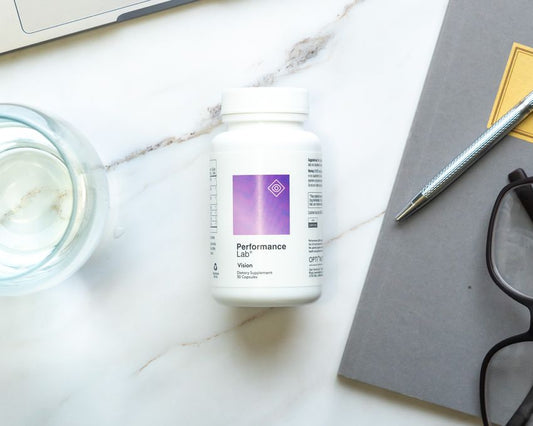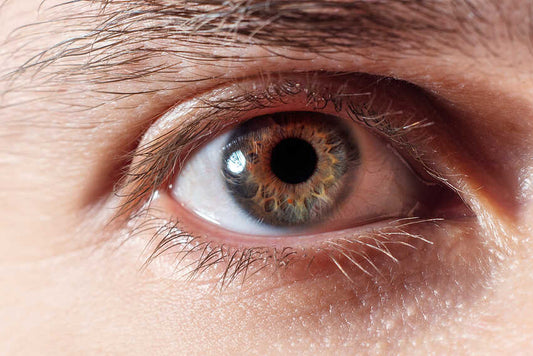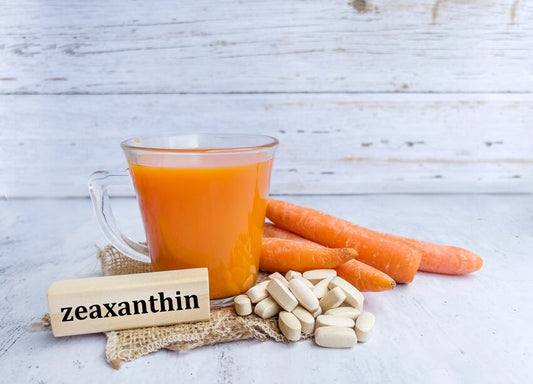Let's face it, we're all attached at the hip to anything with a screen, and it's less than conducive to eye health.
A lot of us spend hours on end sitting in front of computers, and when we do get a break from those, we're constantly checking our mobile phones, browsing a tablet, or watching the TV.
Screens are everywhere, and unfortunately, so is the blue light that's emitted from them that can cause a lot of damage to our eyes.
And if that wasn't enough, the nutrient-poor food that's available to us isn't providing the vital nutrients needed to support proper vision and eye health, and the sun we're exposed to year-round doesn't help either.
While that seems to be the reality right now, it doesn't have to be that way.
Besides improving your diet, wearing sunnies, and reducing screen time (or using light-blocking software and glasses), eye supplements are a great addition to boost eye health and support vision—even if you spend hours in front of a screen.
What Are Eye Supplements?
There's been plenty of claims to fame for nutrition supplements designed to support eye health—not all of it positive—but there's a large chunk to support their efficacy.
But in general, supplements for eye health are a targeted combination of vitamins and minerals that directly support the health of the eyes and prevent the development of various eye disorders.
They will often contain antioxidants that protect the eyes against damage from UV rays and blue light emitted from electronic devices to prevent permanent damage.
What's available largely targets age-related macular degeneration (AMD), which is the leading cause of blindness, as well as glaucoma and cataracts. But eye supplements can also be used to maintain eye health and proper vision.
What The Science Says

Before diving into the research to support eye supplements, let's first discuss a couple of the most common vision disorders: age-related macular degeneration (AMD) and cataracts.
While these two are most common, there are other eye conditions including diabetic retinopathy, glaucoma, ocular tumors, and retinal tears or detachments.
Age-related Macular Degeneration
If you aren't familiar with AMD, it's a slow progressive eye disorder that affects your central vision and the ability to see details directly in front of you; things like reading and driving often become problematic.
AMD is characterized by extensive drusen, visualized as white-yellow deposits under the retinal pigment epithelium and neurosensory retina 1.
There are degenerative changes that occur involving the outer portion of the retina, retinal pigment epithelium, Bruch's membrane, and less frequently, the choriocapillaris 1.
The mechanism behind age-related macular degeneration remains mostly unknown, but several theories suggest that oxidative stress, mitochondrial dysfunction, and inflammatory processes play a role 2-4.
While there's no way to reverse damage caused by dry AMD (central vision loss), supplementing with things like antioxidants, vitamin C, E, zinc, and copper may reduce the risk of advanced AMD 5.
Cataracts
Cataracts are a progressive and painless clouding of the eye's lens, which blocks light and can make it challenging to see clearly. Over time, they can progress and cause blindness.
While most cataracts are age-related, excessive UV exposure can also contribute to cataract formation.
Long-wave UV light readily penetrates the cornea and reaches the lens, where the light is absorbed more efficiently than in any other ocular tissue.
The light is entirely absorbed by small molecules and proteins, where amino acids are converted into photoproducts that accumulate in the human lens, causing the formation of cataracts 6.
Taking preventative measures and supplementing with antioxidants helps to prevent cataract formation.
The Best Supplements To Boost Eye Health
Lutein and Zeaxanthin
While technically two of the most important antioxidants involved in eye health, we're going to lump lutein and zeaxanthin into their own category and discuss them separately from other antioxidants.
They're two carotenoids that give fruits and vegetables their yellow-orange-red pigments. They are found in the highest concentrations in the eye's macula and function to absorb excess light and prevent light-related damage to ocular structures.
They've also been shown to protect against oxidative stress, reduce inflammation, enhance transmission of visual impulses, and play a role in cell-to-cell communication 7.
The proof: One study of diabetic patients supplementing lutein and zeaxanthin showed improved visual performance for all measures (contrast sensitivity, macular pigment optical density, colour discrimination, etc.) compared with the placebo group 8.
Similarly, another double-blind study found that lutein and zeaxanthin supplementation improved critical flicker fusion (CFF) thresholds, visual-motor reaction times, and visual processing speeds in the groups that received the supplements 9.
Vitamin A
Vitamin A is a special nutrient involved in eye health because it's particularly important for night vision.
It's a precursor for the synthesis of rhodopsin, the photopigment found in rods within the eye's retina that enables us to see at night. Vitamin A also serves as a sensitizing chromophore for UV light 10.
Deficiency of vitamin A can lead to a condition called xerophthalmia, as well as conjunctival and corneal xerosis, corneal ulcers, Keratomalacia, and corneal scarring 11.
The proof: A 2001 study of nearly 3000 participants attending the Blue Mountains Eye Study found that those supplementing with a multi, B complex, and vitamin A showed a reduced prevalence of either nuclear or cortical cataracts 12.
Herbal Antioxidants

The purpose of antioxidants is to neutralize endogenous reactive oxygen species by donating an electron to stabilize their outer shell.
While the body naturally has low concentrations of ROS, excessive levels can do a lot of damage, especially to your eyes.
Several plant compounds contain high levels of antioxidants that help to protect the eyes, all of which you'll find in Performance Lab Vision.
- Blackcurrant Extract: Supplies anthocyanin antioxidants that sharpen vision and support healthy blood flow to the eyes. One specific antioxidant, a purple plant pigment called C3G (Cyanidin-3-Glucoside), helps the retina regenerate rhodopsin, a compound required for night vision. Blackcurrant also supports dark adaptation and eye signalling speed.
- Bilberry: Bilberry boosts blackcurrant's antioxidants with a potent matrix of 15+ anthocyanosides that further support rhodopsin regeneration. Bilberry helps to keep eye capillaries flexible, supporting proper blood flow to the retina for enhanced eye health and peak visual performance.
- Saffron: Commonly used in cooking, saffron is a golden spice that supplies antioxidant pigments called safranal and crocin, which protect the macula from free radicals, nourish macular pigment, and boosts blood flow to the eyes. It may also support enhanced motion detection and reduce glare.
- Astaxanthin: Astaxanthin is a powerful antioxidant found in marine algae that supports enhanced blood flow to the retina. Astaxanthin's ocular circulation support also helps with oxygen and nutrient delivery, as well as easing eye fatigue and promoting active visual performance.
If you want to get your hands on all four of these powerful antioxidants, plus lutein and zeaxanthin, Performance Lab Vision is what you need.
Vitamin E and C
Vitamin E and C are also potent antioxidants, but they serve several other functions in the body that make them incredibly multipurpose. However, in the scope of this article, we're going to talk about why vitamin E and C are effective to support healthy vision.They're both powerful antioxidants that help neutralize free radicals generated during normal metabolic processes and can cause severe damage to essential molecules such as proteins, lipids, carbohydrates, DNA, and RNA 13.
Because the eye has a particularly high metabolic rate, there is an increased need for antioxidant protection.
What's more, vitamin C may be able to regenerate other antioxidants, including vitamin E 13.
Vitamin E also benefits ocular health by affecting the expression and activities of molecules and enzymes involved in immune and inflammatory cells, as well as inhibiting platelet aggregation and to improving vasodilation 14, 15.
The proof: A 2001 Age-Related Eye Disease study found that high-dose supplementation with vitamins C and E, beta carotene, and zinc saw a 75% reduced risk of developing cataracts with daily vitamin C intake over 490mg compared to 125mg or less 16.
Another study found that vitamin C and E supplementation, along with carotenoids, may reduce risk AMD progression by up to 25% 17.
Zinc
Zinc isn't something we often think about for eye health, but it's equally important as all other eye supplements, as it's present in high concentrations in ocular tissue, especially the retina and choroid 18.
It's critical for maintaining the health of the retina because of its role as a co-factor for many enzymes, as well as for optimal metabolism of the eye.
Zinc is also a component of the enzyme superoxide dismutase, which has a vital role in scavenging superoxide radicals ad protecting against ROS damage.
What's more, zinc plays a role as an antioxidant and also for immune function, along with a role in the structure of proteins and cell membranes 13.
It's been well established that zinc deficiency causes functional impairments in various parts of the eye 19.
Other Ways To Protect Your Eyes

On top of using Performance Lab Vision, there are a couple of other ways you can protect your eyes from damage and avoid the path to AMD and cataracts:
- Wear 100% UV-blocking sunglasses: UV damage is tricky because you can't see it, but it can severely damage your eyes. Look for UVA and UVB blocking glasses to limit direct exposure to rays.
- Invest in some blue light blocking glasses: Blue light can penetrate both the lens and the cornea to reach the retina and increase the risk of AMD. If you wear glasses, consider investing in blue light blocking lenses, and if you don't, consider investing in a non-prescription blue-blocking pair and wear them whenever you're using devices.
- Install light-altering software: Software like f.lux and Night Shift (iPhones) are great options to alter the colour of your device screens to reduce eyestrain and disruptions to sleep patterns.
Key Takeaways
Supplements aren't the be-all-end-all for eye health. It takes a concerted effort to minimize harm from damaging UV rays (I.e. wear sunglasses, use light blocking glasses with devices, etc.), along with a diet rich in an array of nutrients and supplementation to boost nutrient intake.
Antioxidants play a huge role in protecting the eyes, and they're not just found in supplements. They're widely available in many plant-based foods, so next time you hit the supermarket, choose wisely!
And if you're already doing that, throwing in a daily dose of Performance Lab Vision is only going to further benefit you by supporting your eyes.
- HR Coleman, CC Chan, FL Ferris 3rd, EY Chew. Age-related macular degeneration. Lancet. 2008;372(9652):1835-1845.
- RB Nussenblatt, F Ferris 3rd. Age-related macular degeneration and the immune response: implications for therapy. Am J Ophthalmol. 2007;144(4):618-626.
- MA Zarbin. Current concepts in the pathogenesis of age-related macular degeneration. Arch Ophthalmol. 2004;122(4):598-614.
- FG Holz, D Pauleikhoff, R Klein, AC Bird. Pathogenesis of lesions in late age-related macular disease. Am J Ophthalmol. 2004;137(3):504-510.
- Age-Related Eye Disease Study 2 Research Group. Lutein + zeaxanthin and omega-3 fatty acids for age-related macular degeneration: the Age-Related Eye Disease Study 2 (AREDS2) randomized clinical trial . JAMA. 2013;309(19):2005-2015.
- S Zigman, M Datiles, E Torczynski. Sunlight and human cataracts. Invest Ophthalmol Vis Sci. 1979;18(5):462-467.
- J Mares. Lutein and Zeaxanthin Isomers in Eye Health and Disease. Annu Rev Nutr. 2016;36:571-602.
- AP Chous, SP Richer, JD Gerson, RA Kowluru. The Diabetes Visual Function Supplement Study (DiVFuSS). Br J Ophthalmol. 2016;100(2):227-234.
- ER Bovier, LM Renzi, BR Hammond. A double-blind, placebo-controlled study on the effects of lutein and zeaxanthin on neural processing speed and efficiency. PLoS One. 2014;9(9):e108178.
- S Miyazono, T Isayama, FC Delori, CL Makino. Vitamin A activates rhodopsin and sensitizes it to ultraviolet light. Vis Neurosci. 2011;28(6):485-497.
- KB Feroze, EJ Kaufman. Xerophthalmia. . In: StatPearls . Treasure Island (FL): StatPearls Publishing; 2020 Jan-. Available from: https://www.ncbi.nlm.nih.gov/books/NBK431094/
- M Kuzniarz, P Mitchell, RG Cumming, VM Flood. Use of vitamin supplements and cataract: the Blue Mountains Eye Study. Am J Ophthalmol. 2001;132(1):19-26.
- HM Rasmussen, EJ Johnson. Nutrients for the aging eye. Clin Interv Aging. 2013;8:741-748.
- ER Monsen. Dietary reference intakes for the antioxidant nutrients: vitamin C, vitamin E, selenium, and carotenoids . J Am Diet Assoc. 2000;100(6):637-640.
- MG Traber. Does vitamin E decrease heart attack risk? summary and implications with respect to dietary recommendations. J Nutr. 2001;131(2):395S-7S.
- Age-Related Eye Disease Study Research Group. A randomized, placebo-controlled, clinical trial of high-dose supplementation with vitamins C and E, beta carotene, and zinc for age-related macular degeneration and vision loss: AREDS report no. 8 . Arch Ophthalmol. 2001;119(10):1417-1436.
- PF Jacques, LT Chylack Jr. Epidemiologic evidence of a role for the antioxidant vitamins and carotenoids in cataract prevention. Am J Clin Nutr. 1991;53(1 Suppl):352S-355S.
- BH Grahn, PG Paterson, KT Gottschall-Pass, Z Zhang. Zinc and the eye. J Am Coll Nutr. 2001;20(2 Suppl):106-118.
- ZA Karcioglu. Zinc in the eye. Surv Ophthalmol. 1982;27(2):114-122.















